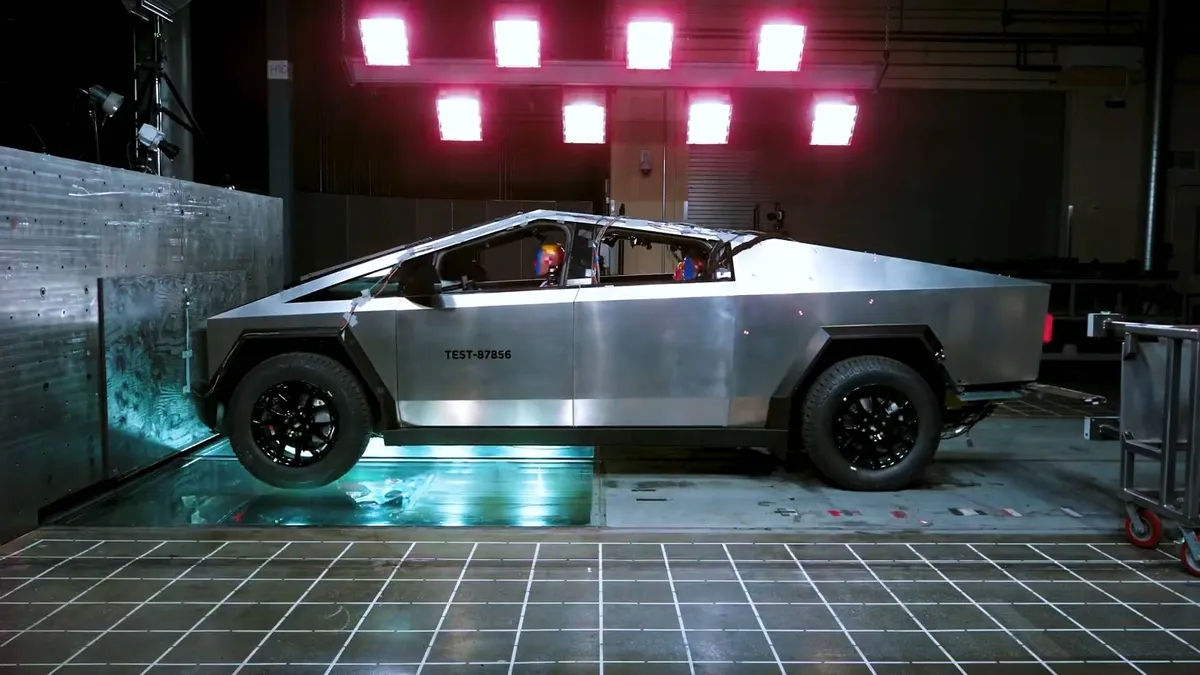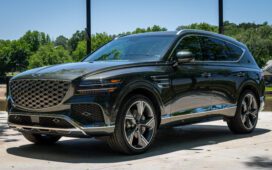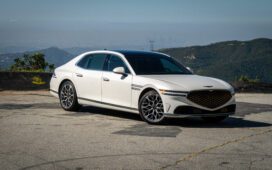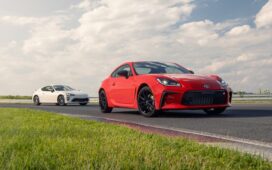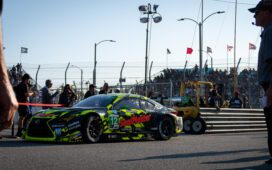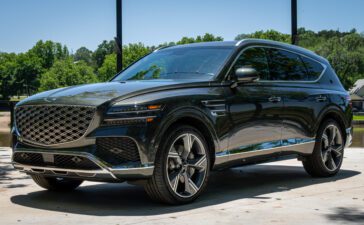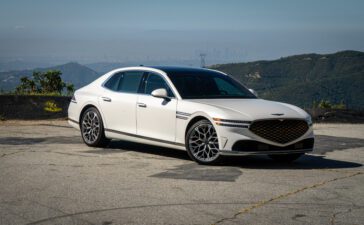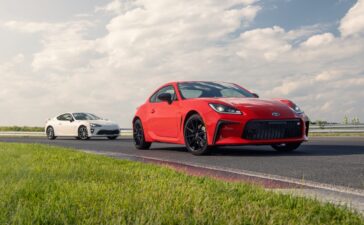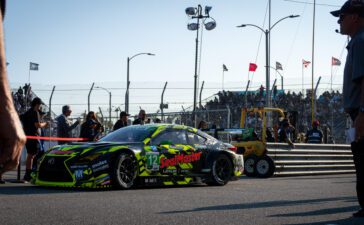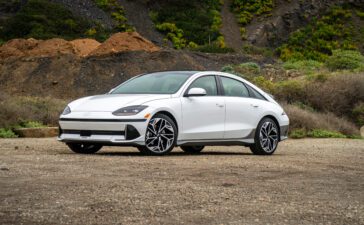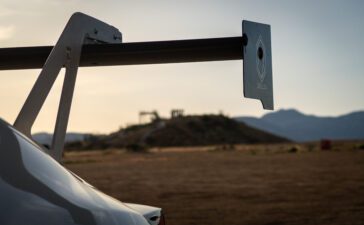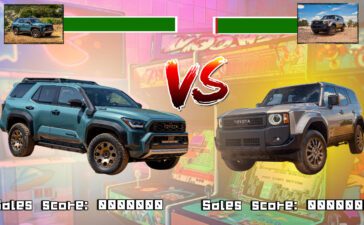Ever since amateur martial arts enthusiast and Tesla CEO Elon Musk announced the Tesla Cybertruck back in 2019 by throwing a danged metal ball into one of the electric pickup truck’s supposedly “unbreakable” windows, the internet has had questions. Why does it look like that? Will it really be $40,000? Is it actually going to have a 500-mile range on a single charge? And most importantly, is the Cybertruck safe?
The answers to a majority of these questions have been “no,” “probably not,” or “we don’t know,” and pretty much every day the Cybertruck’s reputation suffers a new indignity. For instance, this gem courtesy of the “Rides That’ll Beat Your Ass” account on Musk’s X platform (formerly Twitter):
Down the thread, username “Ass_Beaters” provides additional context, namely that this was a prototype, so it lacked recovery or pickup points and, therefore, had to be towed by the suspension. I cannot say for sure, because I have still not seen a Cybertruck in person, but that is probably not the best way to tow one. It’s unfair to judge a prototype model, as it was built for testing and proving certain engineering specs, but let’s be honest, that doesn’t make it not funny.
Did the Tesla Cybertruck pass crash tests?
When the first production models of the Tesla Cybertruck rolled off the production line at the Austin, TX Gigafactory, reporters, enthusiasts, and internet shitposters alike all wondered aloud how it could’ve ever passed NHTSA crash safety ratings. Especially with the distressing videos released by the automaker itself (look at how the dummy in the back goes flying):
Keeping in the spirit of Elon’s “fuck it, we’ll do it live” ethos, the Cybertruck team has continued crash testing the Blade Runner-inspired EV pickup truck and just today shared some new footage, where at least the side airbags deploy so we don’t have to see the poor crash test dummy’s brain get turned to mush:
So how exactly did the Tesla Cybertruck pass the NHTSA’s crash tests? Well, that’s an easy one – it didn’t! As Teslarati noticed earlier this week, Tesla’s new EV pickup truck was added to the safety watchdog’s database, but with ratings conspicuously absent.
That said, digging a bit deeper, you’ll find that apparently millions of cars are sold every year without verified independent crash testing, and even the insurance company-based IIHS (Insurance Institute for Highway Safety) has to pick and choose which cars they’ll test and/or assign ratings to.
One thing’s for sure, Tesla assures that you’ll be safe if a couple of accountants jacked up on Sam Adams Lagers from the 19th hole decide to go absolutely goblin mode on your Cybertruck:
So… Did the Tesla Cybertruck pass crash tests? We’ll give this one a rating of “possibly.” As evidenced by the videos above, Tesla is clearly doing a lot of in-house testing and if not, at least they have an army of weirdos who pay Elon $8 a month for the privilege of saying how normal and cool the tests look. According to CarBuzz, it will likely be a while until the Cybertruck reaches the sales volume to necessitate a proper NHTSA or IIHS review, so we’ll keep you updated if we hear anything official.
That said, it seems unlikely that Elon would want to be known as the guy who killed Jay Leno or Spike Lee, so let’s hope that they’ve crash-tested the Cybertruck.
Can the Tesla Cybetruck be shot with a Tommy Gun and/or arrows?
We’ll cut right to the chase. We’ve already mentioned this before, but yes, Tesla is making the claim that if your Tesla Cybertruck is shot with rounds from a Tommy Gun, you should be safe inside. This could come in handy if those accountants above are cosplaying as old-timey rascals and/or scofflaws.
And if you find yourself at the wrong end of the Battle of the Five Armies and an Orc who looks suspiciously like Joe Rogan has you in his sights, your Cybertruck should survive the onslaught.
That said, we still haven’t seen any news about the windows, which Elon famously shattered with a danged metal ball at an investor event in 2019. Despite the automaker remaining mum on whether or not the windows will be bulletproof as well, Tesla did sell out of what we have to assume is a relatively short run of $55 window decals commemorating the moment. Considering the fact that there are only 10 non-prototype Tesla Cybertrucks on the road, it’s hard to imagine who purchased these.
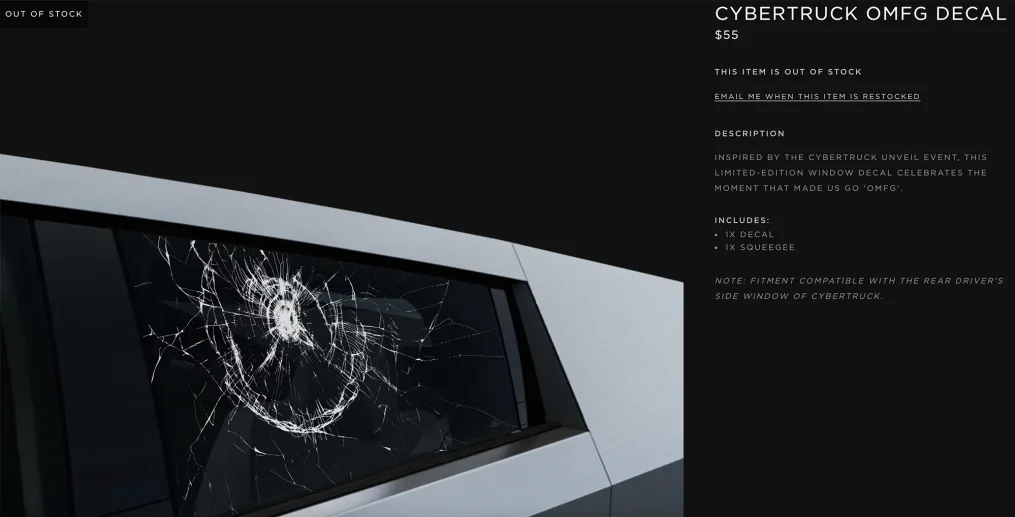
Does the Tesla Cybertruck have crumple zones?
Ever since the Tesla Cybertruck was announced, folks across the internet wondered about one key detail. Musk intimated that the EV pickup truck would lack traditional “crumple zones” in favor of an “exoskeleton” build. As Jameson Dow of Electrek explained back in 2019, based on the initial designs:
Tesla’s Cybertruck design differs from traditional autos because it uses a stainless steel exoskeleton instead of a traditional body-on-frame design. In the traditional design, the car body doesn’t have as much structural integrity and is mainly used for aerodynamic and styling purposes, and to protect occupants from the elements.
In the Cybertruck’s design, the entire vehicle exterior is used as a stressed member, allowing it to do double duty as both the body and the frame. This reduces complexity, and since Tesla is using ultra-hard steel, increases sturdiness of the vehicle’s exterior.
Jameson Dow – Electrek
If you’ve never heard of “crumple zones” before, it’s because they’re something that’s been relatively standard practice in vehicle design since the 70s. According to Traveler’s insurance, the first cars built with “weaker” zones that are meant to absorb, rather than withstand impact were Mercedes-Benz as early as 1959. As this delightful Australian man explains, by absorbing that kinetic energy, less force ends up being applied to the passengers inside the vehicle, preventing or mitigating injury.
Compare the crumple zone footage in that video (or any of the thousands of videos on YouTube explaining the basic concept of crumple zones) to this rendering that has been shared uncritically by Cybertruck-friendly accounts:
So, to answer the question of whether the Tesla Cybertruck has crumple zones? The answer is no. Or maybe “apparently not.” I have a funny feeling this isn’t the last we’ll be hearing about this topic. I saw someone on Twitter claim that the Tesla Cybertruck doesn’t need crumple zones because it will “use all the other cars’ crumple zones” in an accident. I honestly couldn’t tell if the account was satire, so I’m going to leave that factoid as anecdotal.
Either way, a bunch of Tesla fanboys went absolutely nutso after Ralph Nader’s non-profit made fun of the Cybertruck, so clearly they’re going through it.
Is the Tesla Cybertruck safe for pedestrians?
A recent New York Times interactive piece highlighted how pedestrian deaths have been on a steady rise since hitting an all-time low in 1980. Street safety advocacy groups link this to a number of different causes, including city planning, street engineering, and, frankly, the ever-increasing size of American SUVs and trucks.
As you probably know, the Tesla Cybertruck is based on Blade Runner. Or at least it’s a truck that “Blade Runner” (the guy) might drive. That’s why it looks like something your 8-year-old nephew would build in Minecraft. Also, apparently, the reason why the Cybertruck is so pointy is that to make the metal bulletproof, you have to make the truck pointy. Don’t take my word for it, Elon himself said that he tried to bend the metal but it broke the machines.
If this rhetorical tactic sounds familiar, it’s the same one Jenna Maroney from 30 Rock employed when she said she can’t “watch American Idol becaue [she has] perfect pitch.” Either way, the car is sharp as hell, and it might make you wonder, “How did the Cybertruck pass pedestrian crash tests?” Well, the answer to that one’s easy! It didn’t have to.
But it’s unfair to peg that one on Tesla because the United States has no standardized means of evaluating whether or not a vehicle in production has been tested for pedestrian safety. Not only that, the NHTSA only proposed adding such an evaluation this year – so it could be a while. In his official capacity as “Head Twit,” Tesla CEO is “highly confident” that the Cybertruck will be safe for pedestrians.
Fortunately, if you’re in Europe, you are protected by pedestrian safety regulations. According to Euro NCAP, every vehicle sold in the EU must pass VRU (Vulnerable Road User) Protection tests. These tests measure how well new vehicles “protect those vulnerable road users – pedestrians and cyclists – with whom they might collide,” including “the potential risks of injuries to a pedestrian’s head, pelvis, upper and lower leg.”
To Tesla’s credit, their confidence that the Cybertruck will (eventually) pass EU safety regulations seems to be more reliant on the design of its autopilot and full-self-driving systems, which should be hitting European streets and highways in the coming years. Seems like a bit of mixed messaging, given that Tesla just recalled basically every vehicle it has ever sold in the U.S. for a mandatory software update to Autopilot and FSD.
So, to answer the question of whether the Tesla Cybertruck is safe for pedestrians? The answer is “we don’t know, but probably not.” And then you could probably add a little something like, “But to be fair, there are very few trucks sold in America that are probably very safe for pedestrians.” And then you can kind of just shrug and walk away and hope no one asks for any follow-ups.
Is Tesla Cyberbeer Safe?
In case you were planning on paying $75 for a bottle of “Tesla Cyberbeer,” we recommend following the advice of Brian Stone, whose profile proudly claims that he owns not one, but two cars. This is clearly absurd because, as we all know, triples are best.
Conclusion: Is the Tesla Cybertruck safe?
We’ve had our fun today, but what you’re all wondering is whether or not Tesla’s Cybertruck electric pickup truck is safe. Unfortunately, the best we can do is say, “honestly, it doesn’t seem like it.” The production models have been on the street for just over two weeks and we’re already seeing videos of people popping off the fender flares with their bare hands:
It’s clear that fully grown up boy genius Elon Musk is applying the same operating principle to the Tesla Cybertruck that he does to all of his ventures. Do it on the fly, overpromise and underdeliver, and move on to the next thing before anyone has really investigated your prior claims.
It certainly seems like we will eventually see a version of the Tesla Cybertruck that is safe, reliable, and maybe even user-friendly, but none of the videos we’ve seen (including ones shared by Tesla staff!) have given us any confidence that this will be the game-changing EV pickup truck we’ve been promised for nearly half a decade now. We’d love to be proven wrong.

